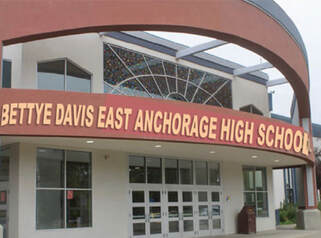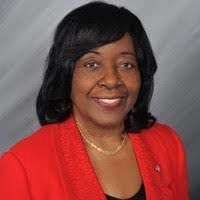A new name for an old school
After weeks of public testimony, on Oct. 20, 2020, the Anchorage School Board began to weigh what had become a surprisingly controversial proposal to rename a venerable Anchorage school. In the end, the board voted to change the name of East Anchorage High School to Bettye Davis East Anchorage High School. The vote was 7-0.
Davis, the first Black woman elected to Alaska’s House of Representatives and the state’s first Black Senator, was a fierce champion for families, children, and education. Her work as a lawmaker supporting Alaskans in need earned her the title Conscience of the Legislature. Across four decades of public life, Davis mentored a generation of Alaskan leaders who wanted to keep her memory alive. Among these was Celeste Hodge Growden, President and CEO of the Alaska Black Caucus. “It’s really appropriate to name something significant like a high school after Bettye Davis,” Growden says. “She served 11 years on the Anchorage School Board. She was so supportive of children and diversity, and East is rich in diversity. They’re a perfect match.” East High is the largest high school in Alaska and the most ethnically and culturally diverse high school in America. At East, diversity infuses everything. Genevieve Mina is a math whiz who tutored fellow students before graduating from East in 2014. “I remember helping a student who was a refugee from South Sudan,” Mina says, “working through those cultural and language barriers. And I remember her writing on a piece of paper ‘Thank you,’ with my name on it in her language, and giving it to me.” Mina pauses, reminiscing. “Yes. Moments like that.” Leighan Gonzales graduated from East in 2013. She recalls her school’s diversity with fondness. “I got to meet people and learn tidbits of language and try food I would never have been exposed to,” she says. “That was really powerful growing up.” Gonzales moved easily among a wide range of students, enjoying activities from theater to flag football. Some friends came from affluent families. She describes her own family as working class. “We had food stamps,” she says. “I had Denali KidCare, my lunch money would run out. So being able to have not only diversity in cultural backgrounds but in socioeconomic backgrounds, that was really welcoming at East.” The Anchorage School District has its own rules for naming schools. They call for community engagement, made harder after Covid-19 closed school buildings. An online poll in August drew opposition to the renaming, especially from East High alumni. Community feedback surged as emails and phone calls flooded the school board. Testimony at board meetings favored renaming East, including calls from Senators Tom Begich, Elvi Gray-Jackson and Georgianna Lincoln. Members of the Alaska Black Caucus - Allies for Change testified by the dozen. One Ally, Regan Brooks, cited research showing that school names can “enhance or undermine welcomeness and belonging” for students. “We all hope for a more welcoming and inclusive society, but it’s not often that we have the opportunity to make decisions that advance it so effectively.” The board’s deliberations began after final testimony on Oct. 20. The Superintendent recommended the board rename Fairview Elementary and the East High Auditorium for Davis, but not East High itself. The board amended the proposal to rename East High. Many who opposed the change feared it would undermine East’s traditions, so board members, led by Starr Marsett, sought to soften the blow. They kept “East Anchorage” in the name and retained East’s iconic Thunderbird mascot, creating what Marsett saw as a “win-win situation.” Deliberations lasted an hour. “Nobody knew the outcome at the start,” says Margo Bellamy, the board’s sole Black member. “I felt in my heart there were at least three votes, maybe four. I also felt if we got four votes, nobody would vote against it. Everybody on this board worked with Bettye, everybody knew her. And that’s how it happened.” Final vote: unanimous. “Really, we’re adding legacy to legacy,” Bellamy concludes. “East High has a legacy of its own, and Bettye Davis has a legacy. And I see the combination of the two as being very, very powerful. It matters that these kids – black and brown and white, every student who walks those halls – will be representing the life of a phenomenal human being and what she stood for. She spoke truth to power in a way power could understand.” As for Davis’ family, “It’s befitting,” says Davis’s son, Tony. “For the hard work she’s done for education. It’s well deserved, and I’m thrilled by it.” |

